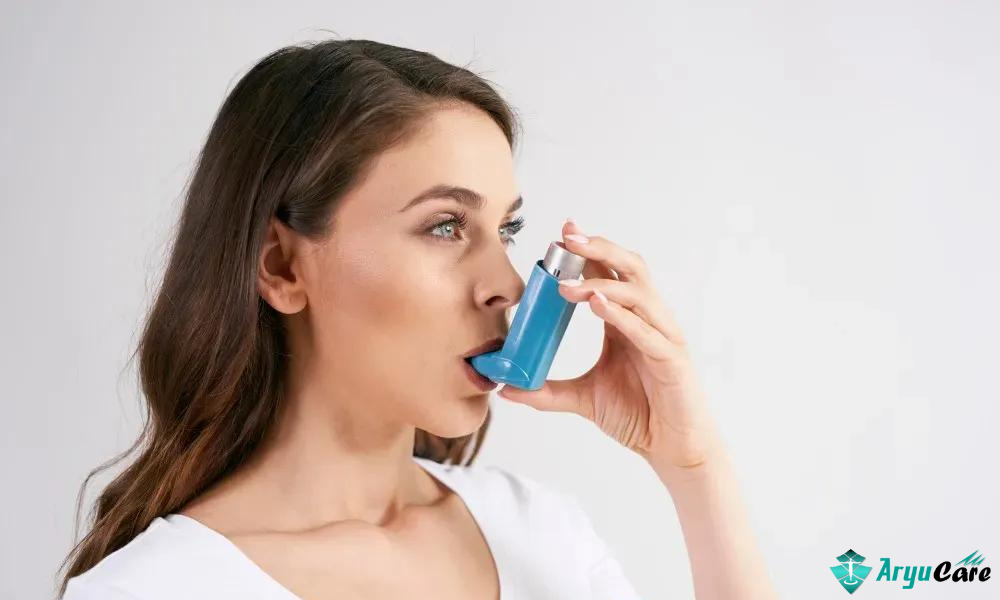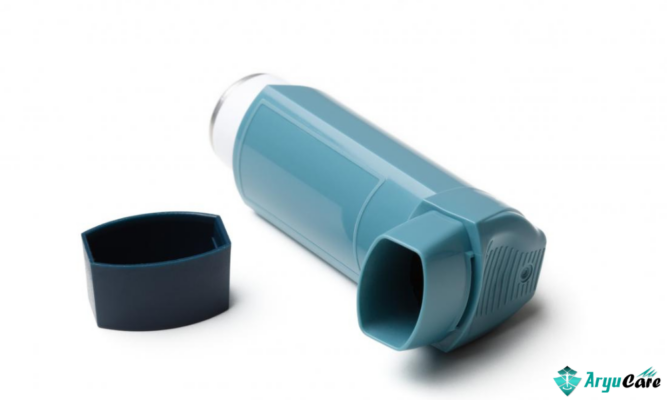Asthma
What Is The Best Treatment For Inhaler Asthma?
Take Control of Asthma
Living with asthma is not an easy thing to do; however, with the necessary tools and knowledge, asthma management becomes a piece of cake.
One of such essential tools is the inhaler, a portable device that has transformed the way asthma is treated. In this detailed guide, we will dive into the world of inhalers, discussing their types, correct use, advantages, and the role they play in improving the lives of people with asthma.
Before we discuss the details of inhalers, we must first understand what asthma is.
This chronic respiratory disease affects millions throughout the world, resulting in episodes of wheezing, shortness of breath, chest tightness, and cough. The daily impact that asthma has on life makes it necessary to manage it effectively.
The Different Types of Inhaler Asthma
There are several types of inhalers which function differently in the process of asthma management. The two main classes are metered-dose inhalers (MDIs) and dry powder inhalers (DPIs).
The difference between MDIs and DPIs is that MDIs release a measured dose of medication in an aerosol form and DPIs deliver medication in a powdered form. The knowledge of these differences allows people to make the best choice of inhaler for their needs.
Selecting the Right Inhaler for You
The choice of an inhaler depends on various factors, including the person’s age, the degree of asthma, and personal preferences. It is therefore important to seek the services of a healthcare professional for personalized advice. They can evaluate your individual needs and advise you on the appropriate inhaler type and medication.
Mastering Inhaler Technique
Inhalers are mostly dependent on technique to work effectively. The correct use of an inhaler guarantees that the drug gets into the lungs, thus providing maximum relief.Here are some general steps to follow:
- Shake the inhaler before each use.
- Completely exhale before placing the inhaler to your mouth.
- Seal your lips around the mouthpiece to ensure a tight seal.
- Take a slow, deep breath, while simultaneously pressing down on the inhaler to deliver the medication.
- Breathe in and hold your breath for 10 seconds to let the medication into the airways.
Advantages of Inhalers in Asthma Treatment
Inhalers offer several advantages in managing asthma:
Rapid Relief
Inhalers work as a quick-relief medication for asthma; they are a fast-acting treatment for relieving symptoms.
Portability
The small size of inhalers makes them portable and usable anywhere, anytime.
Precision in Dosage
Inhalers provide exact doses of the medication, thereby ensuring that the amount that reaches the lungs is enough for effectiveness.
Overcoming Common Inhaler Myths
Like any other medical device, inhalers are often surrounded by myths and misconceptions. It is important to bust such myths for promoting good information and improving their effective use.Some common myths include:
Inhalers are Addictive
Inhalers may also contain other medications important for asthma treatment, but they are not addictive. They are a controlled and essential element of the treatment.
Inhalers Are Only for Severe Cases
Inhalers work for all types of asthma. They may be prescribed for mild or severe cases depending on the condition of the individual.
The Future of Inhaler Technology
The world of inhalers keeps pace with the development of technology. The innovative solutions that are coming up are smart inhalers that are provided with sensors and connectivity.
These devices monitor use, provide reminders, and help in understanding asthma management. The adoption of these technological advances can further improve the efficacy of asthma treatment.
Which inhaler can relieve asthma attack?
The selection of the inhaler can be critical in how quickly an asthma attack can be relieved.Two main types of inhalers are commonly prescribed for this purpose: MDIs and DPIs.
Metered-Dose Inhalers (MDIs)
MDI is a pressurized device that delivers a measured dose of medication in the form of aerosol. This fast-acting inhaler helps to get a quick relief to an asthmatic patient during an attack. It usually includes a bronchodilator drug like albuterol that relaxes the muscles surrounding the airways, enabling easier breathing. The small size of MDIs makes them portable, so that people can carry them with them at all times and have access to their medication whenever necessary.
Dry Powder Inhalers (DPIs)
DPIs, instead, administer powdered drug. Although DPIs are not as fast-working as the MDIs, they are still able to provide relief during an asthma attack. DPIs often include bronchodilators or other medications which open up the airways, enabling better airflow and breathing. DPIs are breath-activated, thus eliminating the need for coordination between inhalation and device activation.
Consultation with Healthcare Professionals
The decision regarding the selection of the appropriate inhaler to relieve asthma attacks is best made with the help of medical practitioners. These should include age, severity of asthma, and personal preferences. Healthcare specialists can offer personalized guidance to ensure that the chosen inhaler meets the needs of the individual, thus maximizing its capacity to deliver timely relief during asthma attacks.
Asthma Inhaler Techniques for Children
Approximately 6 million children in the United States are affected by asthma. Asthma is a common respiratory disorder that may cause breathing problems in your child.
The condition is marked by airway inflammation, which may lead to an asthma attack or other unwanted symptoms. You need to find an appropriate treatment plan for your child’s short-term and long-term health.
Your child may be prescribed an inhaler which can be used in case of an asthma attack. Following are some useful asthma inhaler techniques for children.
Taking Asthma Medications.
Asthma inhalers
Asthma inhalers are the most widely used and effective means of administering asthma medication to your lungs. They come in various forms that operate differently. Some deliver one medication. Some others have two or three drugs. Your doctor might give you:
A metered-dose inhaler that uses a small aerosol canister to deliver a quick puff of medicine through a plastic mouthpiece
A dry powder inhaler that provides the medicine only when you inhale deeply.
FAQS:
1. What is an asthma inhaler, and how does it function?
An asthma inhaler is a medical device used to administer medication to the lungs. It functions by delivering a pre-measured amount of medication, most often a bronchodilator, that relaxes the muscles surrounding the airways, thereby allowing easier breathing.
2. Are all inhalers the same?
No, there are various kinds of inhalers. The two broad groups are MDIs and DPIs with different features and techniques for administration of medication.
3. Are inhalers used in both the prevention and relief of asthma symptoms?
Yes, some inhalers, called combination inhalers, have both preventive and reliever medicines. On the other hand, it is important to discuss with a health professional on the best inhaler depending on the needs of the individual.
4. How frequently should I use my inhaler?
The use of inhaler is determined by the type of medication and the level of severity of asthma. It is very important to follow the dosage and frequency of use as recommended by the healthcare provider.
5. Are inhalers suitable for children?
Yes, inhalers are often prescribed to children who suffer from asthma. The age of the child and the severity of their condition will determine the type of inhaler and the dosage.
6. What are the side effects of using an inhaler?
Different medications can have different side effects. Some of the common side effects are jitteriness, increased heart rate, or throat irritation. Any unusual symptom should be reported to a medical practitioner.
7. How do I clean my inhaler?
Cleaning instructions for inhalers differ. In general, it is advisable to wipe the mouthpiece with a clean, dry cloth. Do not immerse the inhaler in water and always follow the manufacturer’s instructions.
8. Are inhalers safe during pregnancy?
Inhalers prescribed to pregnant individuals with asthma are often used as recommended by their healthcare provider. It is important to discuss the issue with a healthcare professional to determine the safest alternatives during pregnancy.
9. Can inhalers lose their effectiveness over time?
In other instances, the efficiency of inhalers may wane with time. This may be caused by issues like inappropriate storage or expired medicine. The expiration date should be checked and the storage rules should be followed.
10. Are there any other treatments for asthma than inhalers?
Inhalers are the main treatment for asthma, but other treatments may include oral medications, nebulizers, or lifestyle changes. A consultation with a health care provider is necessary to identify viable alternatives.
11. Is it possible to use someone else’s inhaler in case of emergency?
It is not advisable to use another person’s inhaler because the medication prescribed may not be appropriate for your condition. Always keep your prescribed inhaler handy and use it according to your healthcare provider’s recommendations.
12. Can someone without asthma use an inhaler?
Inhalers are manufactured for asthma and other related respiratory disorders. Using inhaler without proper diagnosis is harmful. Consult a health care provider for an accurate diagnosis and proper treatment.
13. Can inhalers cure asthma?
Inhalers help control symptoms of asthma and manage the disease, but they cannot cure asthma. Asthma is a long-term disease which requires continuous care and medication.
14. Is it possible to travel with an inhaler?
Yes, inhalers are mobile and can be used while traveling. It is recommended to keep them in their original packaging, and one should be aware of any travel restrictions or guidelines regarding mediation.
Trending Products:
Asthalin Inhaler | Beclate 100mcg Inhaler 200mdI | Beclate 200mg Inhaler 200mdI | Beclate Cfc Free 200 Mcg Inhaler | Budecort 100 Mcg Inhaler | Budecort 200mcg Inhaler 100mdI | Budecort Inhaler- 200 mcg | Duolin Inhaler | Duova 200md Inhaler | Foracort 400mcg Inhaler 120md | FORACORT 6/100mcg Inhaler 120mdI | Foracort Forte Inhaler | Foracort Inhaler – 6/200 mcg (120 mdi)






As a parent of a child with asthma, I’m always looking for the best treatment options. This article provided valuable insights into the pros and cons of different inhaler treatments, which will definitely help me make more informed decisions regarding my child’s health.
Great article! I’ve been struggling with asthma for years and finding the right treatment can be overwhelming. This breakdown really helps me understand my options better.
This article provided some useful insights into asthma management, but I’m curious about alternative treatments beyond inhalers. Are there any natural remedies worth considering?
As someone who struggles with asthma, I appreciate the breakdown of different inhaler types and their respective benefits. It’s reassuring to know there are options available to suit different needs. Thank you for the informative article!
This article highlighted the significance of understanding triggers and avoiding them. I’d love to learn more about common asthma triggers and practical tips for minimizing exposure to them in daily life.
This article emphasized the importance of working closely with a healthcare provider to develop a personalized treatment plan. It’s a crucial point that shouldn’t be overlooked.
This article provided great insight into asthma treatment options. I found the comparison between inhalers fascinating.
This article is really informative! I’ve been struggling with asthma for a while now, so it’s great to learn about different treatment options. I’m curious to know more about non-medication treatments like breathing exercises.
This article highlighted the significance of personalized asthma management plans tailored to individual needs. I wonder if there are any resources available for patients to collaborate with healthcare providers in developing personalized treatment strategies.
The best treatment for inhaler asthma typically involves using a combination of controller medications, such as inhaled corticosteroids, and quick-relief medications, like short-acting beta agonists, to manage symptoms effectively and prevent asthma attacks.
Interesting read on the best treatment for inhaler asthma! It’s great to learn about the different options available and how they can help manage asthma symptoms. Your explanation was really informative. Looking forward to more articles like this!
I found the section on lifestyle changes and asthma triggers really informative. It’s easy to forget how much factors like diet and environment can impact asthma symptoms.
Hey there! Thanks for sharing this article. As someone who deals with asthma, finding the right treatment is crucial. Inhalers have been a game-changer for me, but I’m always curious about what’s out there. 🌬️👍
Thanks for sharing this helpful article. From personal experience, finding the right inhaler for asthma is crucial. It’s all about finding what works best for your specific symptoms and lifestyle.
Finding the right inhaler for asthma is crucial, isn’t it? From personal experience, I’ve found that a combination of a preventer and a reliever inhaler works best for managing symptoms effectively.
Finding the best treatment for inhaler asthma can be tricky, but it’s all about what works best for you. Whether it’s quick-relief inhalers like albuterol or maintenance inhalers to keep symptoms at bay, the key is finding the right balance with your doctor’s guidance.
I found this article super helpful. It’s great to finally get some clear info on treating inhaler asthma. I’ve struggled with it for years, and understanding the best treatment options is a game-changer. Thanks for breaking it down!
Hey there! Thanks for this helpful article. I’ve been managing inhaler asthma for years, and it’s always great to learn about new treatments. It looks like there’s a lot of promising options out there now! Can’t wait to discuss this with my doctor.
Whether it’s quick-relief inhalers or controller medications, it’s important to work closely with your doctor to manage symptoms effectively. Remember, everyone’s asthma is different, so what works for one person may not work for another. Stay informed and keep breathing easy!
As someone managing asthma, I found the section on lifestyle changes really insightful. It’s reassuring to know there are non-medical ways to complement treatment.
I appreciate the emphasis on personalized treatment plans. It’s so important to tailor asthma management to individual needs.
Finding the right asthma inhaler treatment can be a game-changer. It’s all about finding what works best for you. Personally, I’ve found that [insert specific treatment] has made a huge difference in managing my symptoms.
Inhaler asthma treatment can vary depending on individual needs, but the best approach often involves a combination of medications and lifestyle adjustments. It’s crucial to work closely with your healthcare provider to find the most effective and personalized treatment plan for you.
The best treatment for inhaler asthma? Think of it as your ‘breath buddy’ – always there when you need it!
Ever wondered about inhaler asthma treatments? They’re like having a wind machine for your lungs – keeping things breezy and carefree.